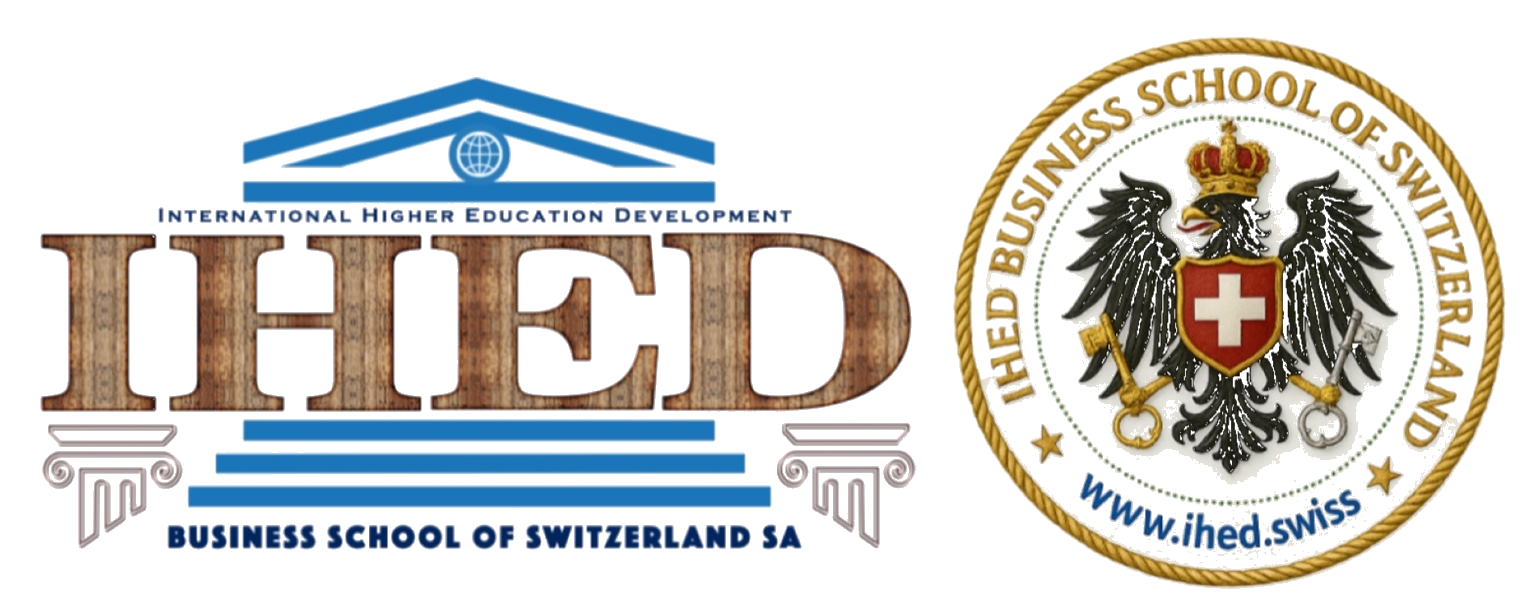



Doctoral studies in Switzerland
DBA – Doctor of Business Administration
The DBA degree is designed to provide business leaders, executives and professionals an opportunity to pursue the next step beyond their MBA or equivalent qualification.
It is equivalent in stature to a Doctor of Philosophy (PhD) degree, but distinct in that candidates pursue applied research rather than theoretical knowledge. The goal of the DBA is to design organisational interventions which help address real- world challenges, and then to evaluate, assess and test the effectiveness of those interventions, and to communicate the findings so that both the world of practice and the world of research can benefit. In this way, the DBA candidates generate new knowledge – the ultimate criterion for the award of a Doctoral degree.
Our DBA is designed to produce scholar-practitioners who can enhance their organisation’s performance through evidence-based practice. It is distinctive in that the goal is the design and creation of an intervention, and rigorous evaluation of the effectiveness of that intervention. The programme therefore addresses three core areas: developing a clear understanding of the nature of the problem(s) or challenges to be addressed; understanding the relevant bodies of knowledge across management, innovation and strategy that may inform an intervention; and designing a research and data strategy to evaluate the effectiveness of the intervention.
In pursuing these goals, the DBA brings together our world leading faculty, a unique degree programme designed to impart critical skills at the highest level, and organisational leaders and entrepreneurs with the desire and ability to make change in their organisations.
1. DOCTOR OF BUSINESS ADMINISTRATION
A. Why IHED Business School of Switzerland?
A DBA at IHED Business School of Switzerland comprises of the following benefits:
Exclusivity – one-to-one access to our world-class faculty
Cutting edge knowledge – access to the latest relevant theories and
research
Tailor-made study – helping you solve an issue in your organisation
Future-proofing – preparation for the future in an uncertain world
New academic theories and practices can take decades to reach the ‘factory floor’, but as a DBA participant you will have direct access to the latest ground- breaking ideas in academia, and learn how to apply them to the activities of your organisation with the support of an experienced and well-matched supervisor, and a board of practitioners that can provide high-level input.
You will join like-minded senior executives to study at IHED Business School of Switzerland, our new state-of-the-art teaching facilities at The Shard, bringing our experienced academic and teaching prowess to the heart of Leman lake, along the Swiss Riviera.
Are you ready for a IHED world?
A DBA at IHED will guarantee and help you to prepare for the future of business, in a constantly changing world. You will learn to look at issues from different angles supported by different theories, taught by world-class research academics. You will also benefit from the experience and support of your fellow DBA participants, sharing ideas and creating solutions to issues in an often volatile, uncertain, complex and ambiguous business world.
Turning theory into practice
Our Professors of Practice are senior, very successful business and industry practitioners, who are experts in facilitating academic research. They can provide high-level input and recommendations to assist you through the process of identifying the academic knowledge and theories most relevant to your chosen issue, and how to apply them in the context of your organisation through practical solutions.
2. DOCTOR OF BUSINESS ADMINISTRATION
A. CourseStructure
Duration
Intensively 2 years, Maximum can be completed within 5 years.
Your research training will include nine 3 day workshops and two 1.5 day workshops at The Shard, delivered by leading WBS faculty. Workshops integrate content, theory, design and research methods, through a review of relevant literature.
Year 1: five 3~5 days workshops and supervision
Year 2: four 3~5 days workshops and two 1.5~3.5 days workshops and supervision
Workshops are themed on: strategic management; leading for change and organisational development; systematic literature review; qualitative research methods; quantitative research methods; academic writing; entrepreneurship; innovation and technology; digital transformation.
Your training will give you access to cutting-edge academic knowledge and design science tools to develop solutions to challenges you face in your organisation and industry.
The DBA focuses on critical analysis of three broad arenas of scholarship: strategy, organization, and people, as well as the areas in which these fields overlap.
Milestones
There are a number of non-assessed milestones across your study period. These help to develop softer skills and application of theory to your writing. At each of these milestones, you will receive tailored feedback from a panel of senior academics to help finesse your project and ensure your research is on-track.
In addition, there are formal milestones in the form of programme review panels where you share and discuss your work with an expert panel, who provide you with important feedback and direction. In order to progress, you are required to pass these milestones.
Portfolio
You will ultimately produce a portfolio of work that presents evidence for a thorough situation analysis, systematic literature review, synthesis of extant knowledge, problem description, solution design, and implementation evaluation. Your portfolio may also include publication in scholarly and/or practice oriented outlets. The requirement for the award of the degree will be to demonstrate innovation in the application of knowledge and in doing so, its extension to the analysis of novel problems in business and management contexts.
3. DOCTOR OF BUSINESS ADMINISTRATION
A. Supervision
Supervision will be provided through a mix of face-to-face meetings at IHED Business School of Switzerland, or email and online interaction.
You will be assigned a supervisor with the relevant expertise. Typically, they will be a research active academic who will provide expert advice and guidance on content and research methods.
In addition, you will have access to a board of practitioners, individually known as WBS Professors of Practice (experienced executives who are also scholar practitioners) who can provide support and guidance on process and development of the portfolio.
Finding a supervisor
Our faculty is made up of world leading experts from every field of business and management. They all are qualified with their doctorate degree from world-wide. All of our faculty are research-active and the majority supervise doctoral research.
4. DOCTOR OF BUSINESS ADMINISTRATION
A. Entry Requirements
You’ll need to show us you have not only the intellectual capabilities, but also the stamina, drive and commitment necessary to undertake independent study. You will have a conversation with our programme academics to discuss the requirements of the programme, and current issues within your organisation that you would like the programme to address during your research.
Academic and professional requirements
You will need both of the following:
An upper second class honours at Undergraduate level (or equivalent) plus a good MBA or other Masters degree
A minimum of 5 years senior management experience
Please note these are minimum entry requirements and, as there are a limited number of places available on the programme, we will select the candidates with the best academic and professional credentials and whose research interests are aligned with the available expertise in IHED Business School of Switzerland. Applicants who meet all of these criteria will be interviewed by the Academic Dean Prof.Dr.Johnny KIM before an offer of a place can be made.
English language requirements
If English is not your first language, you must meet a minimum overall standard in a recognised test of English, examples are shown below. You must show a good balance across all sections of the test and it must have been taken within two years starting the course. IHED Business School of Switzerland will require your certificates as evidence.
5. DOCTOR OF BUSINESS ADMINISTRATION
A. Fees
The fee entry to the Doctor of Business Administration is payable in the following instalments:
Year 1.
Semester 1: CHF.10,000
Semester 2: CHF.10,000
Semester 3: CHF.10,000
Year 2.
Semester 4: CHF.10,000
Semester 5: CHF.10,000
Semester 6: CHF.10,000
Please note
the minimum allowable duration of part-time degrees at the IHED Business School of Switzerland is six(6) semesters, two(2) years, with a maximum allowable period of five(5) years.
What’s included
The fee includes study materials, registration, tuition, supervision, lunch and dinner at induction, lunches and refreshments during workshop attendance, dinner and refreshments at the supervisors event, executive coaching sessions, access to the IHED Distinguished Seminar Series and other senior events advertised across the IHED Business School of Switzerland, the option to book IHED facilities at The Shard for private/group study purposes outside of workshop attendance, use of IHED Business School of Switzerland campus student facilities, hot-desking facilities at the University’s main campus, free black and white printing allowance, free car parking (where available), All Cohorts Annual Dinner. Your AMP Certificate program is included, free of charge.
It excludes residential accommodation, travel, costs in relation to research and data collection, thesis printing and binding, thesis resubmission fee (if required), graduation robes and photographs, graduation ceremony.
An Executive level of support is provided throughout your DBA journey, with enhanced cross-networking opportunities via social activities, extended feedback sessions and first-class supervision provided from experts across the school and wider IHED Business School of Switzerland.
How to pay
You can pay your tuition fee in a lump sum at the start of the academic year, or you can pay in instalments throughout the year (50%: 25%: 25%). Must discuss with an Academic Dean.
To secure your place on the course you must lodge a CHF.2,000 deposit with us within four weeks of receiving your offer. The deposit is part of the total fee, not an additional cost..
Benefits for IHED Alumni
We offer a 15% fee discount for the alumni of IHED Business School of Switzerland or any IHED partner universities.
6. DOCTOR OF BUSINESS ADMINISTRATION
A. Apply
How to make your application:
Check you meet our eligibility criteria with our Academic Dean
Contact the DBA team to discuss your personal requirements by email.
Applications are submitted via our online.
Your application will consist of a Curriculum Vitae and a one-page
document expressing what you are interested in researching, and how you intend to use the academic insights offered by the programme to tackle a specific issue within your organisation.
Applications for Spring semester and Summer semester closed. Fall semester is now open.
Please note that we do not have variable start dates.
7. DOCTOR OF BUSINESS ADMINISTRATION
A. Global Community
The IHED Business School of Switzerland global community is a network for graduates and students throughout our international partner universities.
Our doctoral community
You will be part of a dynamic, highly esteemed and international research community, collaborating with leading scholars and fellow business leaders.
Dual DBA & Ph.D. Degree Diploma
Dual Degree for Doctorate Programmes
- DBA : 6 Semesters, 2 Years,
- PH.D : 9 Semesters, 3 years (DBA + 1 more year, 3 semesters)
- IHED offers the DBA, Ph.D. on Weekend Modules and Distance Learning Program
DBA
Year 1 : Fall + Spring + Summer semester
Year 2 : Fall + Spring + Summer semester
PHD.
Year 3 : Fall + Spring + Summer semester
The IHED DBA is an executive doctoral programme for motivated, high achievers who want to develop their research, analytical and critical thinking skills to the highest level.
The Doctorate in Business Administration is structured around a research project driven by the individual, with a focus on practical application in the business environment.
- Develop the highest-level thinking and research
- Present your findings at conferences globally
- Contribute to your own professional practice
The DBA Programme Structure
The programme is offered on a flexible part-time basis and takes 6 semesters, 2 to 3 years to
Semester 1, 2 and 3 : comprise five taught modules delivered at the School
Semester 4, 5 and 6 : comprise individual supervised research and study.
Throughout your studies you’ll develop your research, analytical, conceptual and critical thinking skills to the highest level. You’ll also gain a strategic focus that will enable you to contribute to your own professional practice and the wider subject area.
DBA / PH.D. IN LEADERSHIP & INNOVATION
Aims
- To develop students’ knowledge and understanding of ecological approaches to organizations, the methods and models of organizational dynamics.
- To assist students in understanding typical biases and argumentation fallacies and advise them how to avoid these mistakes.
- To assist students in understanding the basis of mental models, key intuitions of organizational ecology and make them acquainted with the theory fragments that have been developed so far.
- To develop students’ understanding of the relationships between theory fragments of organizational ecology and other competing theories, such as institutional theory or the theory of industrial organizations.
Content
- Introduction: the ecological approach to organizations vital events
- Organizational codes. Reproducibility, inertia and identity. Fitness and mortality
- Age-dependence of the mortality hazard of organizations
- A cognitive theory of organizations: audiences and producers, fuzzy categories
- Contrast dependence of the vital rates: founding and disbanding
- Organizational learning and innovations
- Propagation strategies, HR blueprints
- Social dynamics: models and methods
- Theories of organizational niche
- Resource partitioning
- Inertia of organizational niche
- Contemporary research technologies
Learning Outcomes
Subject-specific knowledge
- Have an advanced knowledge and understanding of the context and nature of the world of organizations in contemporary societies, an understanding of organizational dynamics in general, and the models and methods appropriate to study them
- Have an understanding of the problems and issues in researching the ecology of organizations
- Have an understanding of typical biases and argumentational fallacies, and knowledge of how to avoid these mistakes
- Have an understanding of the relationships between theory fragments of organizational ecology and other competing theories, such as institutional theory or the theory of industrial organizations.
Subject-specific skills
- Ability to critically evaluate theories of organizations
- Ability to critically evaluate different research practices
- Ability to develop appropriate research strategies to address theoretical and practical challenges, in particular:
- the use of archival data
- developing time series; dealing with missing data point issues, and censoring
- the ability to use event history analysis to estimate transitions rates, vital rates, Gompertz and Weibull models, etc
- theory development, non-monotonic reasoning techniques, theory unification.
Key skills
- Ability to make an initial formulation and articulation of a potential scheme of research
- Ability to understand and resolve the problems and issues in undertaking doctoral research
- Ability to formulate, articulate and complete a scheme of research at doctoral level
- Enhanced personal effectiveness
- Effective written communication
- Advanced skills of self-awareness and time management
Modes of Teaching, Learning and Assessment and how these contribute to the learning outcomes of the module
- The module will be delivered in a workshop format over an intensive three-day teaching block. Workshops will comprise a balanced mix of lecture- and seminar-type delivery combined with small group discussions and other activities as appropriate to the nature of the material.
- Learning will also occur through tutor-supported, as well as self-support learning groups. There will also be on-line teaching support through a module blog. Finally, guided reading will address key topics. This range of methods will ensure that students will acquire the advanced skills and knowledge to enable them to develop a thorough understanding of this specialist field of study.
- The summative assessment will comprise a 30-minute oral examination and accompanying written assignment, to prepare students for subsequent stages of the programme – ultimately the doctoral thesis/viva.
Summative assessment
Written assignment designed to test students’ knowledge and understanding of the subject matter and their ability to articulate a researchable issue, 5,000 words.
Formative assessment
Individual-based presentations and tutor feedback within workshops; individual 3500-word assignment.
Specializations
- For those interested in extending their program to earn an Executive DBA degree with an area of specialized emphasis, we offer the following specific industries, functions, concentrations/specializations:
- Choosing a major
7 Specialized Majors
Business Administration (BA)
Leadership & Innovation (LI)
Hospitality Management (HM)
International Business & Global Management (IBGM)
International Tourism Management (ITM)
International Relations & Diplomacy (IRD)
International Marketing (IM)
Start Dates / 3-Semester Per Year:
- Fall Semester – October,
- Spring Semester – February,
- Summer Semester – June
